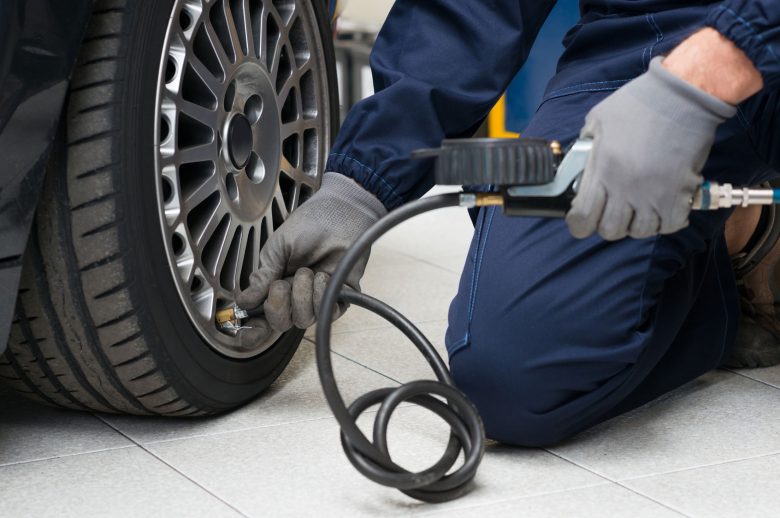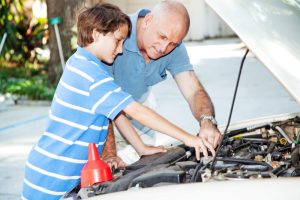Tires are made of more than just rubber. To keep you safe and comfortable on the road, they connect your car to the road. Properly maintaining your tires is important for your safety, the performance of your tires and their lifespan.
Why It is Important to Maintain Your Tires:
Many drivers don’t think about maintaining their tires, but it is an important part of staying safe on the road. Well-maintained tires can give you better grip, handling and braking power, especially in bad weather. Plus, regular maintenance can help your car use less gas and extend its life, saving you money in the long run.
Conduct Regular Inspections:
The most important part of tire maintenance is regular inspections. You should check it regularly for signs of damage, such as cuts, bulges, or uneven wear. These problems could be signs of a larger problem with your tires or suspension that needs immediate repair.
In addition to visually inspecting your tires, it is important to regularly monitor your tire pressure. Having the correct tire pressure is important for safety and efficiency. Underinflated tires can cause your car to use more gas, wear unevenly, and drive poorly. On the other hand, over-inflated tires can make driving difficult and make it harder to grip the road.
Rotate the Tires:
Another important part of tire maintenance is rotating your tires. Changing your tires regularly will help your tires wear evenly and extend their lifespan. Front tires wear out faster than rear tires due to the forces of steering and parking. Rotating them distributes the wear more evenly.
Every 6,000 to 13,000 miles, or as your car manufacturer tells you, you should replace your tires. If you know what you are doing and have the right tools, you can change your tires yourself. If not, you can have this done by a professional as part of your annual maintenance.
Align the Wheels:
People often forget to align their wheels, but this is very important for the life of the tires and the driving behavior of the car. If your tires are wearing unevenly, your steering wheel is shaking, or your car is pulling to one side, there is something wrong with your car. Your wheel balance should be checked annually, or if you notice any of these symptoms.
Align Tires:
Another important part of tire maintenance is balancing your tires. When you balance your tires, they wear normally and do not experience vibrations that can affect the handling and ride comfort of your car. Vibration in the steering wheel, especially at highway speeds, is a sign of imbalance.
When you buy new tires or notice problems with your existing tires, you should have them balanced. This process is very quick and cheap, but can greatly improve your driving experience.
Correct Inflation Method:
The right amount of air in your tires is important for the safety, efficiency and longevity of the tire. Underinflated tires can cause your car to use more gas, wear unevenly, and drive poorly. On the other hand, if the tires are overfilled, they may not have good grip and the ride may be difficult.
Check your tire pressure regularly with a tire pressure tester to ensure it is correct. The owner’s manual or a sticker on the driver’s side door jamb will tell you the best tire pressure for your car. For the most accurate measurements, make sure the tires are cold when adding air to the recommended pressure.
Tire Storage:
Storing your tires properly is very important, especially if you have seasonal tires. Tires should be stored in a cool, dry place, away from direct sunlight and away from heat sources. If tires are not stored properly, they can be damaged and deteriorate more quickly, shortening their lifespan.
Repair Tires:
If you discover a hole in your tire, check to see if it can be repaired. Most small holes can be repaired with plugs or patches, but larger holes or sidewall damage may mean the tire needs to be replaced. Temporary solutions such as tire plugs should only be used as a last resort when all else fails. As soon as possible, have your car inspected by a professional.
Replace Tires:
For your safety on the road, you need to know when to replace your tires with new ones. Check for tread wear marks, uneven wear, cracks, or bulges on the sidewalls: these are all signs that new tires are needed. You must replace your tires with new ones before you reach the legal tread depth limit of 2/32 of an inch.
When replacing tires, it is important to choose the right tires for your car and the road conditions. For optimal performance and safety, consider factors such as tire size, load rating, speed rating and tread design.
Conclusion:
All in all, keeping your tires in good condition is important for your safety, your car’s performance, and the life of your tires. By using the tips in this article, you can ensure that your tires last longer, perform better, and stay safe on the road. An important part of tire care that should not be overlooked is regular inspections to ensure that your tires are properly inflated, rotated, aligned, and balanced.
FAQs:
1. How often should I check my tire pressure?
Check your tire pressure at least once a month and before a big trip. When tires are properly filled, they use less gasoline and last longer.
2. Do I have to have someone else replace the tire, or can I do it myself?
You can change your tires yourself if you know what you’re doing and have the right tools, but many people prefer to have a professional do it during regular maintenance inspections to ensure it’s done correctly.
3. Which of the following are signs that I need new tires?
Some signs include visible tread wear, uneven tread wear, and cracks or bulges on the edges. It is important to purchase new tires before they become dangerous.
4. How does wheel alignment affect tire life and car handling?
Aligning your wheels ensures that they are all straight and going in the right direction. Misalignment causes uneven tire wear and makes the car more difficult to drive, reducing safety and performance.
5. Do I need to balance my tires?
It is important to balance your tires so that the weight is evenly distributed and does not cause vibration. When you buy new tires or notice problems with your existing tires, you should have them balanced.



